By Wayne Gillam, photos by Ryan Hoover / UW ECE News
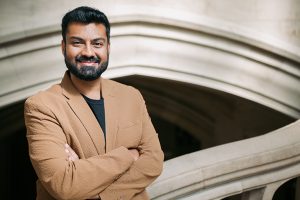
UW ECE Associate Teaching Professor Mahmood Hameed has a talent for connecting with students. He is known for his exceptional ability as an educator, the love and respect he has for his students, and his passion for teaching.
UW ECE Associate Teaching Professor Mahmood Hameed has a superpower — his unique ability to connect with students. He also has a super-powerful memory. Hameed memorizes and can recall the name of every student in his classes who talks to him at least once. That’s right, all of them. Hundreds of students take Hameed’s courses every quarter, but years later, he still remembers the names of everyone who spoke with him. For many students, he can also remember their personal interests as well as their academic and career goals. This superb recall is but one example of Hameed’s exceptional ability as an educator, which stems from the love and respect he has for his students and his passion for teaching.
“At times, it can freak students out when three or five years later, I still remember their name and some of their interests. I’m not trying. After a while, it’s just there in my memory,” Hameed said. “I believe it is a privilege to teach. I purposefully memorize my students’ names because that’s a way of showing respect and investing in our connection.”
As his students can attest, Hameed is an extraordinary professor.
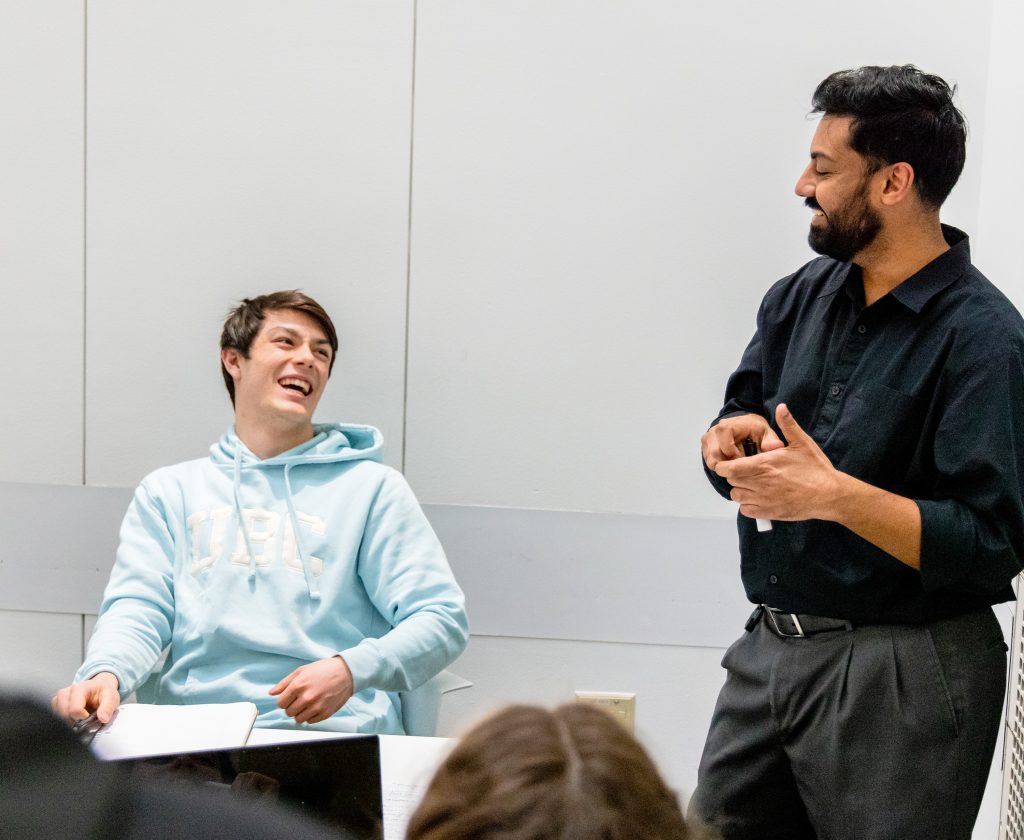
UW ECE undergraduate Kyle Orth has taken several courses from Hameed.
“From the moment one enters Professor Hameed’s classroom, it becomes clear that he is far more than an instructor. He strives to learn each individual’s name, creating an atmosphere of trust and mutual respect,” said UW ECE undergraduate Feier Long, who has served as a teaching assistant for Hameed. “He is a genuine mentor who inspires individuals to grow and discover their potential. He does not merely teach, he guides, encourages, and supports in a way that leaves a lasting impression on those fortunate enough to learn from him.”
“Professor Hameed is an exceptional instructor. He is passionate, goes above and beyond to engage his students, and clearly wants us not only to succeed in his classes, but also to grow in our enthusiasm for the field,” said UW ECE undergraduate Kyle Orth. “He is an extremely interesting person to talk to, not only for his expertise in the field, but particularly for his eagerness to connect you to resources that will help you succeed. He loves getting to know people and has an unmatched passion for helping students understand complex topics in electrical and computer engineering.”
In 2023, Hameed received a UW ECE Outstanding Teaching Award in recognition of his contributions to the Department and the impact he has had on students. This honor, received early in his career, could make one wonder how Hameed developed his “superpowers” in the classroom. There is no doubt that some of his exceptional abilities were there from birth, but others were formed by his upbringing, environment, and journey to UW ECE.
Connecting knowledge with purpose
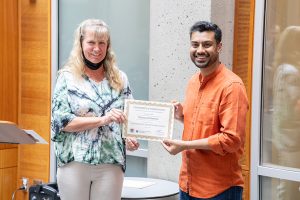
UW ECE Professor Denise Wilson presenting Hameed with the 2023 Outstanding Teaching Award certificate in an awards ceremony held in the Allen Center Atrium.
Hameed grew up in Southern India, in the city of Hyderabad. As a child, he became fascinated with remote-controlled toy cars that his father brought home for him to play with. He wanted to learn how the cars worked and how signals were sent through the air. This childhood fascination soon blossomed into a lasting interest in other electronic devices. He also was born into a family environment and culture that emphasized science and technology. This mix of nature and nurture pointed him toward engineering early in life.
Surprisingly, Hameed said that he wasn’t a particularly good student until college. He had trouble seeing the value and practical purpose for what he was taught in high school. Despite this fact, He attended Osmania University in Hyderabad. There, he learned first-hand the difference good teachers can make in a student’s life. At Osmania University, Hameed had instructors who took the time to show him how what he was learning was relevant to the real world. This was the missing spark. Once Hameed could connect theoretical knowledge with practical applications, he could see purpose for the work he was doing. This then motivated him to study hard and excel. In 2005, he earned his bachelor’s degree in electronics and communication engineering, graduating with highest distinction.
“When I teach something, and students are able to make connections, and things start making sense to them, I can see it in their eyes, I can see it in their face. That, to me, is rewarding.” — UW ECE Associate Teaching Professor Mahmood Hameed
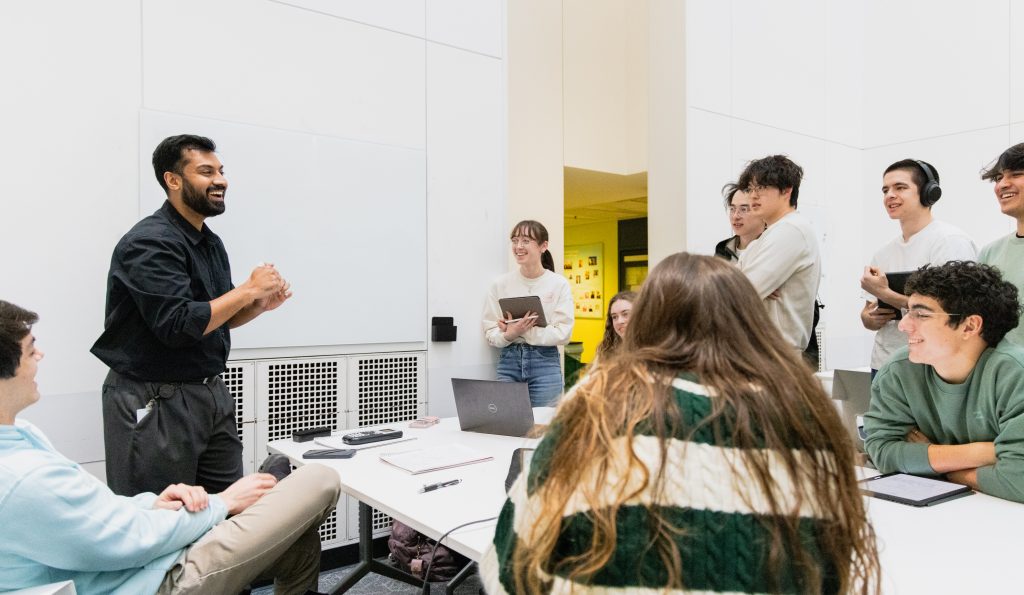
Hameed giving a lesson to EE 242 and EE 233 students during one of his popular “active group office hours” sessions. Pictured left to right: Kyle Orth, Rachel Juliet Walland, Sophie McGee, Qifeng Yang, Jiwei Zheng, Frankie Lee Reyna, Max Gonzalez, Nathan S Joslin, with Leeza Leonova seated with back to the camera.
Hameed then chose to make a big leap, moving from India to America. He attended the University of Kansas, where he received his master’s and doctoral degrees in electrical engineering. He said he learned how to be a good teacher from the instructors there, such as professors Rongqing Hui, David Petr, and James Stiles. He worked as a lecturer for a year at the University before completing his doctoral studies in 2016 and accepting a position as lecturer at the Rensselaer Polytechnic Institute, where he worked for five years. In early 2022, Hameed and his family moved to Seattle, so his wife could accept a job opportunity while he continued to work remotely.
“Leaving RPI was one of the most difficult things for me to do because the bonds that I had formed with students and faculty were very strong,” Hameed said. “But there was a promising opening at UW ECE. So, I applied, was accepted, and I started working here.”
In September 2022, Hameed joined UW ECE as an assistant teaching professor. Since then, he has built a solid reputation for excellence among students, faculty, and staff in the Department. In addition to instructing students, Hameed conducts engineering education research. He has received grants to develop hands-on activities in core classes as well as explore issues students face related to diversity, equity, and inclusion. In September 2024, he joined the UW ECE Office of the Chair as undergraduate program coordinator for the Department.
“I work with the advising team to identify areas of improvement. Given that I am well connected with students, it’s quite easy for me to get a feel for what problems are bothering them and what can be solved,” Hameed said. “We have amazing students, faculty, and staff. And, to me, it’s a family. I feel like I’m connected to the soul of the Department.”
An educator who loves to teach
Hameed teaches 10 courses at UW ECE. Most of these courses are for undergraduates, but two are graduate-level. In the spring, he plans to teach two more graduate-level courses that will be part of the Department’s Professional Master’s Program. He said he likes this full workload and structure because it allows him to be with students throughout their undergraduate studies and into the start of graduate-level work. And if it’s not clear by now, Hameed loves to teach.
“I sometimes tell my wife that I don’t know if I’m living to teach or teaching to live. It holds a really special value for me, an emotional one.” Hameed said. “I try to teach students in a way that is inspiring. I think that is about relevance, about students feeling that they can make a change for good in the world. If they can get inspired by that idea, no one can stop them.”
Motivated by his own undergraduate experience connecting knowledge with purpose, Hameed said he wants his students to make that same sort of connection. To this end, he works toward helping students see how in-class learning can be applied to solving problems and addressing challenges in business, government, and society at large.
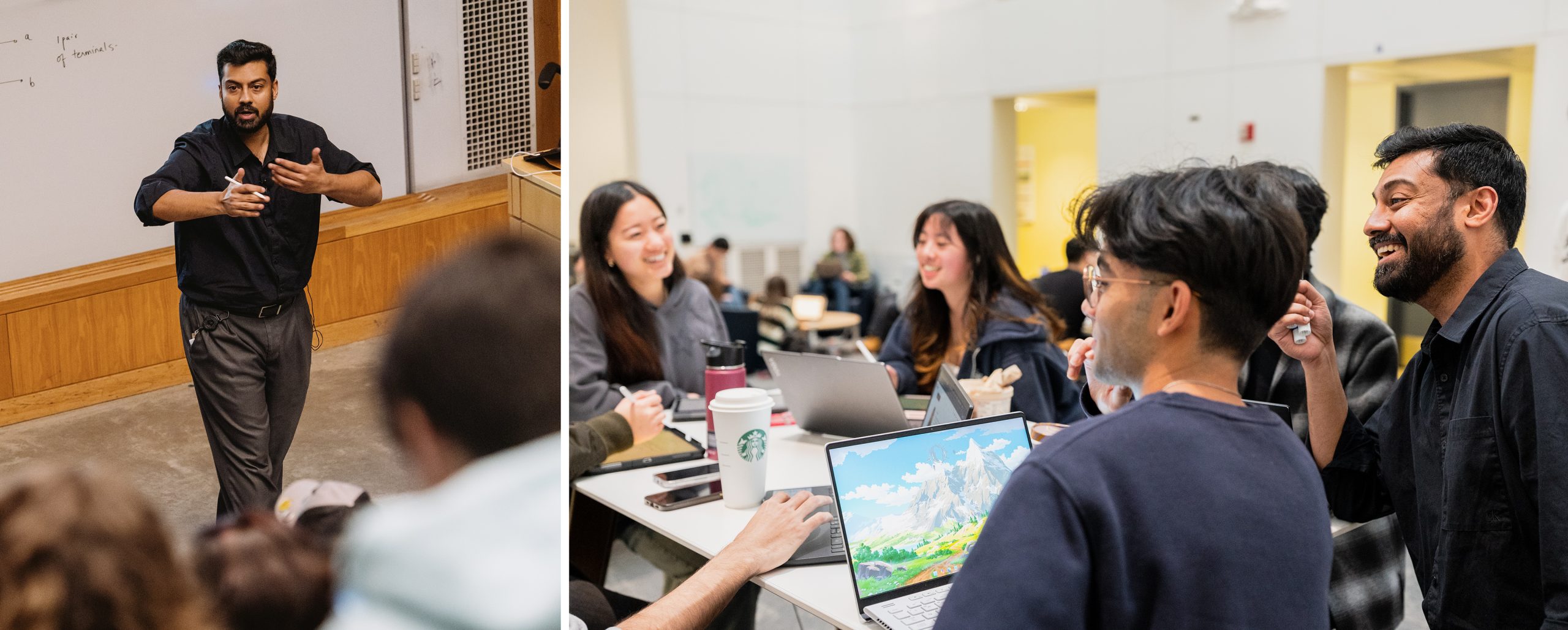
(left) Hameed teaching the EE 233 Circuit Theory course during winter 2025 quarter; (right) Hameed talks with a group of UW ECE undergraduate students during office hours, including, left to right, Grace Liu, Grace Kara Lee, and Ayush Kulkarni (foreground).
“Professor Hameed does a wonderful job of giving us context throughout each course of where we are headed,” Orth said. “He ties theoretical knowledge to practical examples, along with anecdotes about what sorts of real-world problems are solved with the techniques and skills we are taught in class.”
Hameed goes the extra mile for his students by providing helpful coaching and advice both in and out of class. He also constructs rigorous exams to ensure that his students’ knowledge is solid. Hameed said he realized that engineering can sometimes be a difficult field, one that requires determination and commitment for success.
“In order for me to teach my students well, I have to give them everything I have. But in order for them to know what their limits are, I have to test them in a challenging manner,” Hameed said. “Without that challenge, I’m disrespecting the student. At some time during the student’s life, there is a point where they accept that all the struggle is worth it. That’s the moment I’m after.”
Hameed said he is continually refining his teaching and mentorship techniques. He collaborates on engineering education research with the Office for the Advancement of Engineering Teaching & Learning in the UW College of Engineering. He also is planning future collaborations with UW ECE faculty who study engineering education, such as professors Denise Wilson, John Raiti, and Sep Makhsous. This spring, he will also be a part of the Washington State Academic RedShirt (STARS) resilience program by participating in Fail Forward, an event where UW leaders share stories with students about how personal failures can build resilience and help lay the foundation for future success.
Building community and looking ahead
In the future, Hameed said he plans to continue designing new engineering courses that are interesting and inspiring to students. He also intends to take on more administrative roles, so he can influence positive change and build community in the Department. He anticipates remaining committed to engineering education research. His latest research paper investigates the transformative potential of scheduled, informal interactions between students and teachers in large engineering classes, and the paper will be published soon.
Other activities Hameed enjoys are being an adviser for the UW Washington Hyperloop club and the UW Boring Club (an engineering projects club). He also plans to participate in the UW Peaks and Professors hiking group. Outside of his interests in electrical and computer engineering, Hameed loves to play cricket and racquetball. He also enjoys cooking.
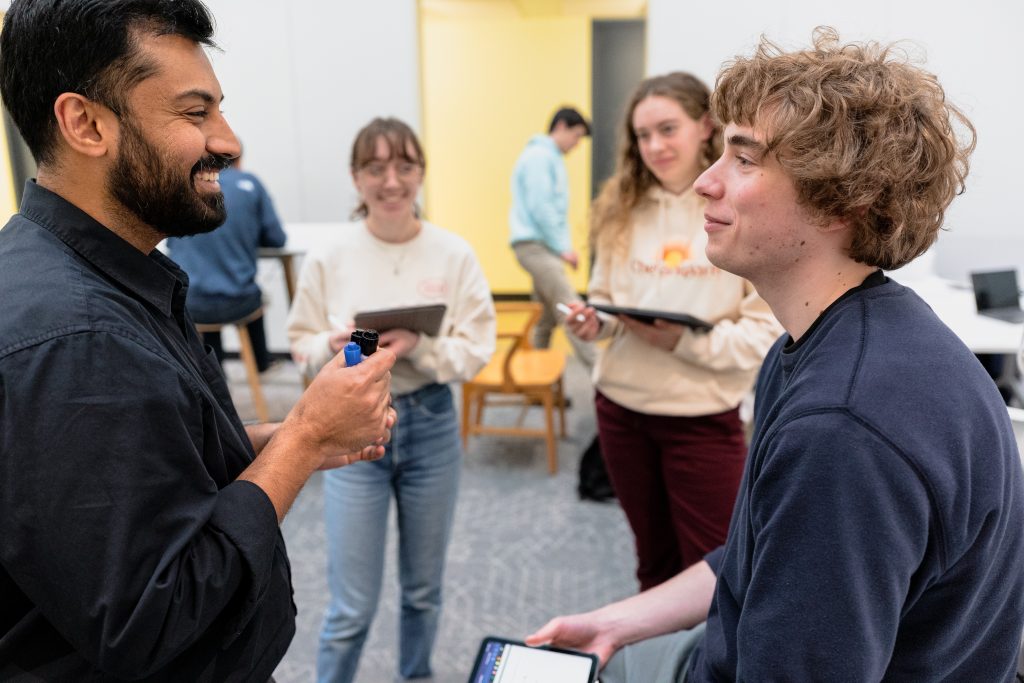
Hameed answers a question from UW ECE student Stephen Wilson Ottaway, while students Rachel Juliet Walland and Sophie McGee wait their turns to speak with Hameed.
When asked what advice he might offer undergraduate students, Hameed said that he would like to see students focus more on the learning experience, rather than on their grade point average. He emphasized that success in engineering is not necessarily about good grades or high intelligence, but rather, it is about the amount of time and energy a student is willing to put into learning. He also expressed a hope that his teaching and mentorship will enable students to succeed in their own careers and then use their skills to do good in the world. Judging from what his students say, he is well on his way to achieving this goal.
“If I could start over my entire ECE journey, I would gladly take all my core classes with Professor Hameed. He is an invaluable asset to the Department, and his mentorship has profoundly enriched my academic journey,” Long said. “His enthusiasm and passion go beyond teaching — he genuinely cares about helping students recognize and reach their full potential. I will always be grateful for the impact he has had on me and my education.”
Learn more about UW ECE Associate Teaching Professor Mahmood Hameed on his bio page.

